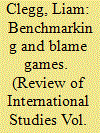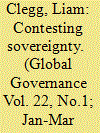| Srl | Item |
| 1 |
ID:
142238


|
|
|
|
|
| Summary/Abstract |
Benchmarking has long been a central component of the global development industry, with the most prominent recent initiative being the Millennium Development Goal (MDG) framework. However, within existing scholarship, the agent-level interactions surrounding the MDG framework remain under-explored. Here, on the back of an analysis of interactions that took place within and around key MDG review summits, I develop a typology to clarify the intersection of benchmarking and blame games. Overall, I demonstrate that despite the efforts of the MDG architects to insulate the initiative, blame games have permeated policymakers’ engagements with the framework. Moreover, the content of these blame games have been carried over into the recently outlined Sustainable Development Goals (SDGs). A pattern of strategic clarification has seen the emergence within this follow-on SDG framework of more precise responsibilities on higher-income states to meet aid targets, and on lower-income states to meet governance reform targets. Given the deeply-embedded cleavages that were evident in UN review summits, similar blame games seem likely to follow the periodic evaluations within the SDGs’ lifespan.
|
|
|
|
|
|
|
|
|
|
|
|
|
|
|
|
| 2 |
ID:
144469


|
|
|
|
|
| Summary/Abstract |
There is a battle over military expenditure at the International Monetary Fund, with consistent pressure from its most powerful member for the Fund to get tough on military expenditure being pitted against lowerorder states' invocation of the organization's sovereignty-protecting rules and practices. While the formal victory of the lower-order states has been codified in the Fund's relatively weak Guidelines on Military Expenditure, on a case-by-case basis policy shifts continue to be imposed on borrowers through the application of informal influence by the US Executive Director in the IMF boardroom. By integrating insights from literature exploring the tension between formal rules and informal practices in international organizations, this case study extends the understanding offered in the international relations literature of the foundations of sovereign inequality in international politics.
|
|
|
|
|
|
|
|
|
|
|
|
|
|
|
|